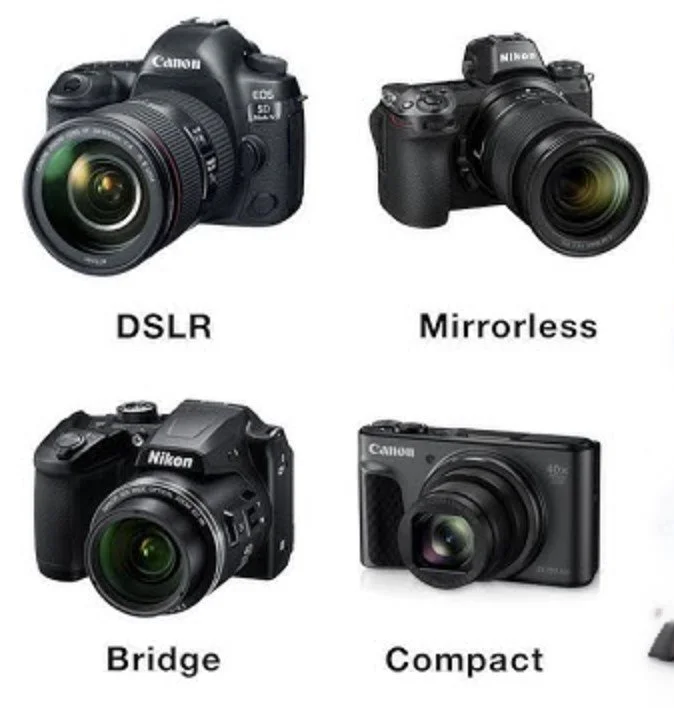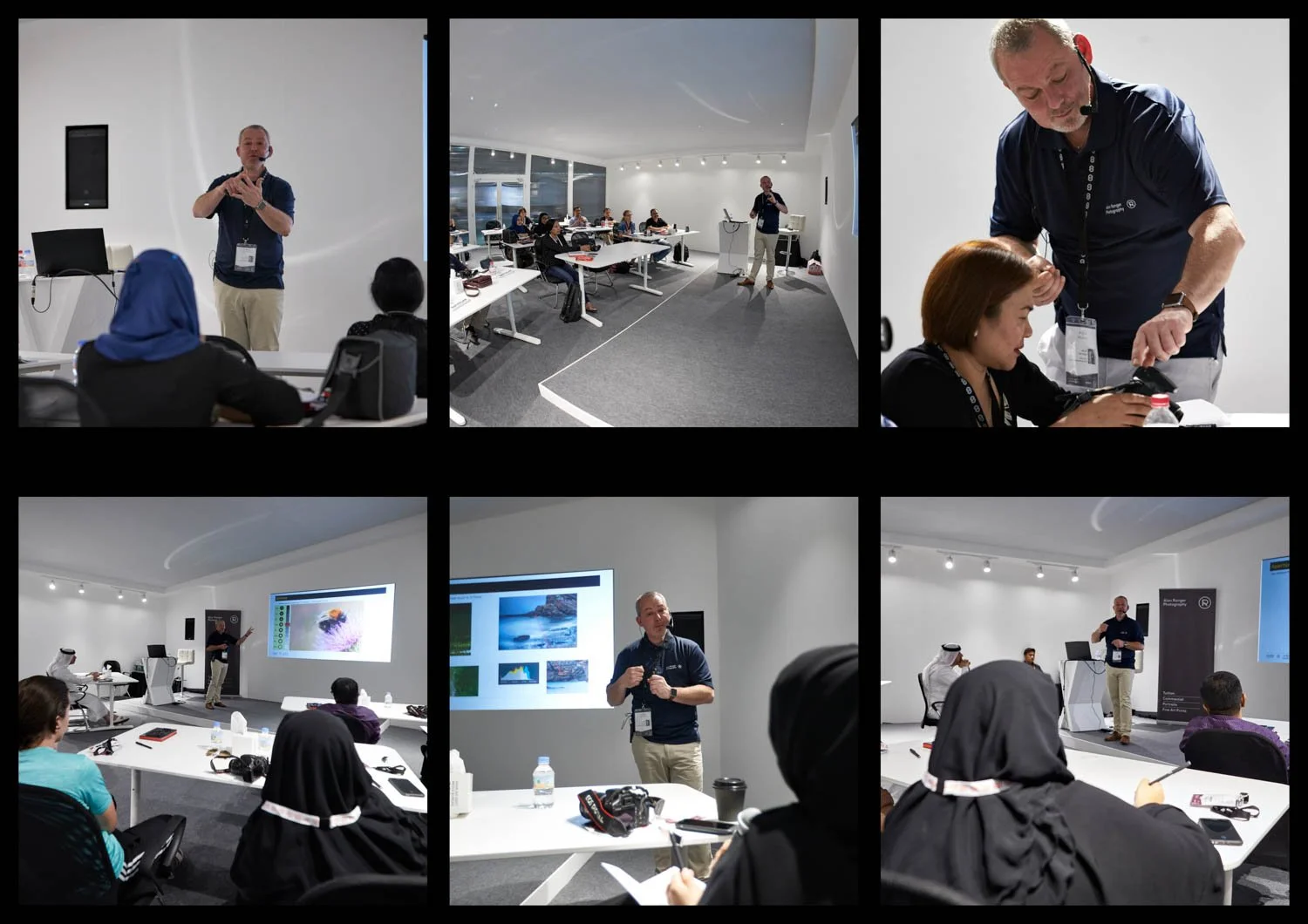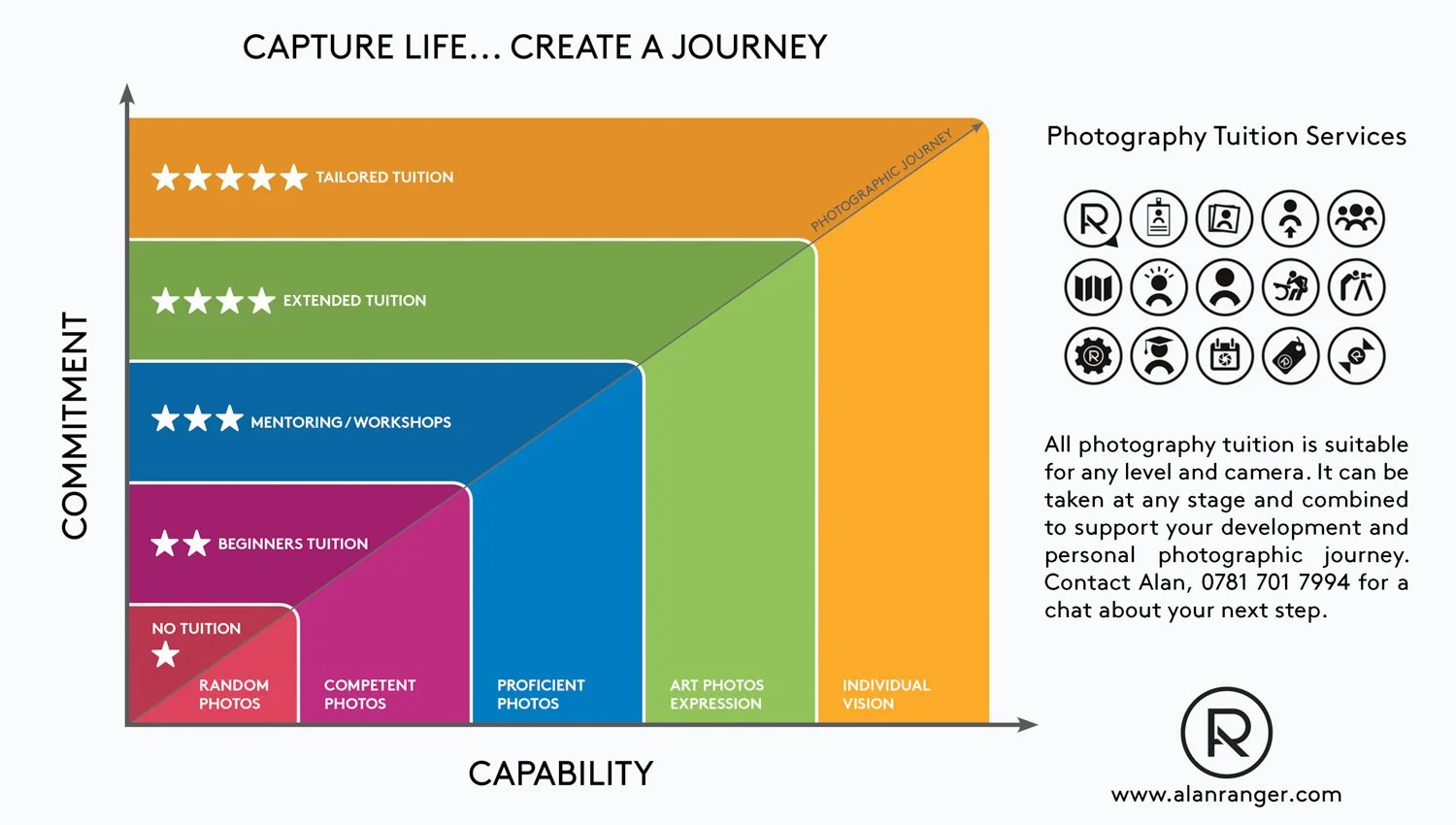CLASSES
Beginners Photography Course
Weekly Classes - Coventry
Lightroom Photo Editing Course
Weekly Classes - Coventry
RPS Accreditation
Online Mentoring for RPS
Photography Mentoring
Monthly Assignments


To Shoot Your Products or Services
Professional photos for your product, property, services and company


If you're eager to learn photography and take your skills beyond the casual snapshots captured with smartphones and basic point and shoot cameras, consider a DSLR photography course. Such a course can propel your passion for photography, overcoming the limitations of simpler devices. This article will delve into the advantages of upgrading to a DSLR camera from a point and shoot and the transformative impact of photography lessons. Embrace the journey of self-expression and unleash your creativity as you embark on an educational path to elevate your photographic prowess.

The debate of point and shoot vs dslr and dslr vs phone camera often centers on control and quality. Upgrading to a DSLR from a point and shoot camera means gaining full control over your photography. With a DSLR, you can manually adjust settings like aperture, shutter speed, and ISO, allowing you to capture images that truly reflect your vision. This level of control adds a unique and personal touch to your photographs, distinguishing them from the automatic modes of simpler cameras.
DSLR cameras boast a significant advantage over point-and-shoots due to their interchangeable lenses, which stand in stark contrast to the best-fixed lens camera. The difference between DSLR and point and shoot is also highlighted by the versatility of DSLR lenses, allowing photographers to experiment with various perspectives. From wide-angle lenses for expansive landscapes to telephoto lenses that bring distant subjects into view, and macro lenses that reveal intricate details, a DSLR opens up a world of creative potential.
When it comes to digital photography, DSLR cameras are renowned for their superior image quality, thanks to larger image sensors. These sensors offer better light sensitivity, less noise, and an enhanced dynamic range, enabling you to capture images with more detail, richer colours, and impressive performance in low-light conditions. No matter the subject, be it landscapes, portraits, or still life, a DSLR camera ensures your photographs are a cut above the rest.

What is a DSLR camera? A DSLR camera, also known as a digital single-lens reflex camera, is a type of camera that uses a mirror and prism system to allow the photographer to see exactly what will be captured by the camera's sensor. This type of camera is popular among professional photographers and photography enthusiasts due to its versatility and ability to produce high-quality images. DSLR cameras offer a wide range of features and settings, allowing photographers to have full control over their images. They typically have interchangeable lenses, which means that photographers can choose the lens that best suits their needs for a particular shot. DSLR cameras also offer manual controls, allowing photographers to adjust settings such as aperture, shutter speed, and ISO to achieve the desired exposure and creative effects. In addition, DSLR cameras often have larger image sensors compared to other types of cameras, resulting in better image quality, especially in low-light conditions. With the advancement of technology, DSLR cameras have become more accessible and affordable, making them a popular choice for both professionals and hobbyists alike. Whether you are a beginner or an experienced photographer, a DSLR camera can provide you with the tools and capabilities to capture stunning photographs. So, if you are interested in photography and want to take your skills to the next level, consider investing in a DSLR camera. It will open up a whole new world of creative possibilities and allow you to capture moments in a way that truly reflects your vision and style.

DSLR (Digital Single-Lens Reflex) cameras and Mirrorless cameras are two popular options for photographers. Both types of cameras have their own unique features and advantages, making it important for photographers to understand the differences between them.
DSLR cameras have been around for a long time and are known for their reliable performance and high-quality images. They use a mirror and prism system to reflect light into the optical viewfinder, allowing photographers to see exactly what the lens sees. This optical viewfinder provides a clear and real-time preview of the scene, making it easier for photographers to compose their shots. DSLRs also offer a wide range of lens options, allowing photographers to choose the best lens for their specific needs.
On the other hand, Mirrorless cameras are relatively new to the market but have gained popularity in recent years. As the name suggests, these cameras do not have a mirror or prism system. Instead, they use an electronic viewfinder (EVF) or the LCD screen to display the image. This electronic viewfinder provides a digital preview of the scene, which some photographers find more convenient and accurate. Mirrorless cameras are also generally smaller and lighter than DSLRs, making them more portable and easier to carry around.
In terms of image quality, both DSLRs and Mirrorless cameras can produce stunning photos. DSLRs typically have larger sensors, which can result in better low-light performance and higher image quality. However, Mirrorless cameras have been catching up in this aspect, with some models now offering full-frame sensors that rival those found in DSLRs.
Autofocus is another important factor to consider. DSLRs traditionally have had faster and more accurate autofocus systems, thanks to their dedicated phase-detection autofocus sensors. However, Mirrorless cameras have made significant advancements in autofocus technology, with some models now offering hybrid autofocus systems that combine phase-detection and contrast-detection autofocus. This allows for faster and more precise autofocus performance, especially when tracking moving subjects.
When it comes to video recording, Mirrorless cameras often have the upper hand. They are designed with video capabilities in mind and offer features like 4K recording, in-body image stabilization, and focus peaking. DSLRs, on the other hand, may have limitations when it comes to video, such as limited recording time and lack of in-body stabilization.
In conclusion, both DSLR and Mirrorless cameras have their own strengths and weaknesses. The choice between the two ultimately depends on the photographer's specific needs and preferences. Whether it's the optical viewfinder and extensive lens options of DSLRs or the compact size and advanced video capabilities of Mirrorless cameras, photographers have plenty of options to choose from in today's market.
When it comes to choosing a camera, one of the key factors to consider is the type of sensor it has. There are two main types of sensors: crop sensor and full-frame sensor. Each has its own advantages and disadvantages, and understanding the differences between them can help you make an informed decision.
A crop sensor, also known as an APS-C sensor, is smaller than a full-frame sensor. It captures a smaller portion of the image, resulting in a narrower field of view. This can be advantageous in certain situations, such as when shooting wildlife or sports, as it effectively magnifies the subject. Additionally, crop sensors tend to have a higher pixel density, which can result in sharper images.
On the other hand, a full-frame sensor is larger and captures a wider field of view. This can be beneficial for landscape photography or situations where you want to capture more of the scene. Full-frame sensors also tend to perform better in low-light conditions, as they have larger pixels that can gather more light.
When it comes to image quality, both crop sensor and full-frame sensor cameras can produce stunning results. However, full-frame sensors generally have an advantage when it comes to dynamic range and low-light performance. This is because they have larger pixels that can capture more detail and gather more light, resulting in less noise and better overall image quality.
Another factor to consider is the cost. Full-frame sensor cameras tend to be more expensive than crop sensor cameras. This is due to the larger size and higher manufacturing costs associated with full-frame sensors. However, the price difference has been decreasing over the years, making full-frame cameras more accessible to a wider range of photographers.
In conclusion, the choice between a crop sensor and a full-frame sensor ultimately depends on your specific needs and budget. Both types of sensors have their own strengths and weaknesses, and understanding these differences can help you choose the camera that best suits your photography style and goals.

For those new to the craft, photography courses offer a welcoming entry point into a world that may otherwise seem intimidating with its technical terms and complex gear. These photography lessons provide a structured environment to build a solid foundation in photography, covering key topics like exposure, composition, and post-processing. A well-designed photography course ensures that you understand the essential principles and techniques needed to succeed. If you want to learn photography and make the most of your DSLR camera then the quickest route to learning the photography basics is to book yourself on a photography class. If you are not local to me in Coventry, I also offer online photography lessons over Zoom.
Photography classes offer a major benefit: personalised instruction from seasoned photographers. These experts teach the technical aspects of photography and provide invaluable feedback on your work, helping you to refine your photography skills. They assist in pinpointing your strengths and areas for improvement, fostering your growth as a photographer. Under their mentorship, you'll learn insights and techniques that would otherwise take years to acquire.
Photography lessons extend beyond technical skills to nurture your creativity and help you develop a distinctive artistic style. Engaging in various assignments and projects, you'll be encouraged to tackle different subjects, play with composition, and embrace innovative thinking. The support of your instructors and the camaraderie with fellow students can lead to a newfound appreciation for street photography and other genres. As you gain confidence and find your own photographic voice, you'll discover joy and fulfilment in your artistic journey.

When it comes to choosing a photography course, it's essential to do your research. Look for photography courses that align with your interests, skill level, and desired learning outcomes. Consider factors such as course duration, curriculum, instructor credentials, and student reviews. Whether you prefer in-person classes or online platforms, there is a wide range of options available to cater to your needs.
To ensure the quality of your photography education, consider photography courses offered by reputable professional photographers. These courses provide a comprehensive learning experience, covering both technical and artistic aspects of photography. Look for courses that offer hands-on practice, interactive discussions, and opportunities for critique and feedback.
In addition to general photography courses, consider exploring speciality workshops that focus on specific genres or techniques. These workshops allow you to delve deeper into areas such as landscape photography, portrait photography, or even advanced post-processing techniques. Specialty photography courses provide targeted learning experiences, enabling you to refine your skills in specific areas of interest.

Embarking on the path beyond what is a point and shoot camera is an exciting and transformative journey. By upgrading to a DSLR camera and enrolling in photography lessons, you unlock the potential to capture breathtaking images and express your unique perspective. Remember, it's not just about the technical aspects; it's about embracing your creativity, finding inspiration in the world around you, and continuously learning and growing as a photographer.
The benefits of going beyond digital point and shoot cameras are immeasurable. You'll have the ability to control every aspect of your images, from composition to exposure. You'll capture exceptional image quality, thanks to the advanced features of a DSLR camera. And with the guidance of photography lessons, you'll develop the skills and confidence to take your artistry to new heights. So, why wait? Take the leap and unlock your photographic potential today.
In conclusion, upgrading to a DSLR camera from a point and shoot, and immersing yourself in photography lessons is a transformative experience. By embracing artistic control, harnessing the power of interchangeable lenses, and capturing superior image quality with compact cameras, you'll elevate your photography to new heights. Through structured learning, personalized guidance, and the unlocking of your creative potential, you'll witness a remarkable transformation in your skills and artistic expression. So, don't settle for simply pressing the shutter button of a simple digital camera. Embrace the journey beyond point and shoot and unlock your true photographic potential.
Alan is a professional photographer and tutor with over fifteen years of experience delivering photography education and commercial photography services across the UK.
Alan Ranger's exceptional professional credentials, accredited by the BIPP (British Institute of Professional Photography), have earned him the esteemed status of an approved photography training provider for renowned brands like Jaguar Land Rover. Moreover, he has had the privilege to deliver more than 30 enlightening lectures on photography education at the prestigious Xposure International Photography Festival in the UAE.
In addition, Alan has mentored and taught over 5,000 photography enthusiasts over the last fifteen years. Through his varied service approaches suited to each individual.
Beyond his professional pursuits, Alan has also collaborated with schools to organise photography workshops for children with special needs. By providing them with this platform, he empowers them to express themselves creatively and discover their unique perspectives through a camera lens.
Environmental consciousness is at the core of Alan's business ethos. He takes great pride in adopting green and responsible practices throughout his operations, ensuring that his business and events maintain a carbon-neutral footprint.
In conclusion, Alan Ranger is an expert in his field and a compassionate educator who believes in photography's transformative power. Through his guidance and support, individuals can unlock their creative potential and embark on a journey of self-discovery in the captivating world of photography.

